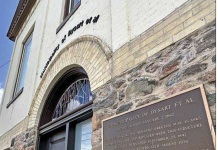Phil Harknett, who lives between two short-term rentals (STRs) on a small lake in Dysart, appealed to County council June 28 to finally regulate and tax the industry.
“What we have here is second homes that people have invested in as a business, and it’s time this County got down to taxing and regulating these businesses,” he said.
Harknett added STR owners would be charged under the regulations to generate revenue for the County and townships. He noted regulating would also ensure the safety of renters. He added STRs are affecting long-term rentals, housing prices, and the ability of businesses to get staff due to a lack of housing.
With more than 10 STRs on his lake of 45 properties, he said it’s a myth they’re good for the economy because renters bring everything with them and do not leave their cottages.
Harknett said Lake of Bays and the City of Kawartha Lakes are acting but, “we don’t have anything. The County doesn’t have to reinvent the wheel here. We just need to talk to other municipalities to find out how this is done. I’m asking you guys not to kick this can down the road… it’s time. Let’s get this done.”
Highlands East was the first township to discuss possible regulation of the industry in 2018. Algonquin Highlands briefly flirted with it as well. However, it has rested at the County level for years now. Despite there being draft bylaws, with legal opinions, County council has yet to pull the trigger, although Warden Liz Danielsen said they are close.
County considers a contractor
Much of last week’s meeting was devoted to the topic.
Director of planning, Steve Stone, said since the early days of municipalities implementing STR programs, there have been “a number of third-party services arising to help assist municipalities in rolling out and regulating the program.”
He said the companies pinpoint where STRs are, from advertising and agencies. He estimated there are close to 1,500 in the County. He said they would contact operators about licensing. They send out e-forms, such as a code of conduct, verifying inspections for Ontario Building Code, fire compliance, and septic system performance. They also monitor compliance and have a 24/7 complaint hotline. They also contact municipal staff for follow-up.
CAO Mike Rutter confirmed he and lower-tier CAOs had met with a third-party provider. He added the cost of hiring them would be significantly less than program revenue.
Coun. Murray Fearrey said, “I certainly like this approach. It’s going to take a tremendous load off staff here.” He also wanted onus on the property owner to say he or she has complied, with possible spot checks.
Rutter said the idea is a self-attestation of criteria being met followed by an audit over four or five years of all properties. Coun. Cec Ryall said they could use demerit points for “verifiable trust.”
Coun. Bob Carter said if they went with that, they could go directly to licensing and not need registration. He added no taxpayer dollars should go into the program, but it should be paid for by STR owners.
Fearrey also felt they should implement a municipal accommodation tax at the same time. A final decision has yet to be made on a MAT tax.
MAT provides funding for the tourism industry, as well as programs and services for visitors.
During the meeting, council also revisited the draft bylaws, determining they would license for a year; allow two people per bedroom, one parking spot per bedroom – with appropriate septic – appeals going to the County; not renting out bunkies as separate rentals; and demerit points for offences with three leading to license suspension.
Council voted to put out a request for information from a third party, have director of economic development, Scott Ovell, update a MAT tax report, and make amendments to the licensing bylaw for a future meeting.
Danielsen said: “we made some good steps today, really moving ahead.”





